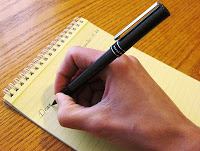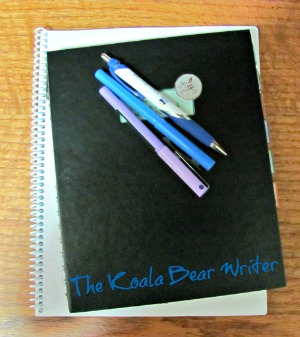I grew up reading voraciously. We never had a TV, so instead of watching the latest programs, I’d sprawl on our brown plaid couch reading whatever book I could get my hands on. The bigger the book, the better. I had an adult library card long before I turned eighteen, because on a children’s card I could only borrow four books at a time. That wasn’t enough to keep me reading for the week before we could make it back to the library again.
When I was ten, Mom gave me an old black planner in which to keep track of the books I’d read. I wrote down the title, author, and the date I finished the book. Some entries are neat, carefully written in blue or black ink. Others are hastily scrawled in pink and purple. Many books appear multiple times; I read the entire Narnia series twice in one year. Many titles bring back memories, some vague as I haven’t read the books again, others fond as I know the books very well.
From Reading to Writing
 I suppose it was because I was reading so much that I started writing. I received a diary when I was ten and scrawled irregularly in it for the next two years. I wrote a few stories for school, about my teddy bears and what they did when I was out of the room. Another story was based on exploring an old abandoned house with my best friend, but I embellished it with what could have happened.
I suppose it was because I was reading so much that I started writing. I received a diary when I was ten and scrawled irregularly in it for the next two years. I wrote a few stories for school, about my teddy bears and what they did when I was out of the room. Another story was based on exploring an old abandoned house with my best friend, but I embellished it with what could have happened.
I was fourteen when I printed my first book. It was one hundred and fifty pages long, computer typed, single spaced. It is a fantasy about two people from enemy tribes who work to stop the fighting between their tribes. The ideas came to me slowly; the opening scene was a picture in my head as I sat at my computer, and the story unfolded from there. Then I got stuck at the end, unsure how to finish it, until a comment from Dad inspired me.
My family knew that, when I was sitting at the computer typing, I was working on a story. They pestered me for years to print something for them to read. I said I would when it was ready. Part of me was scared. What if they laughed at my ideas or told me my story was terrible? I was nervous about giving them my book for Christmas, and tiptoed around for the next few days while they read. I needn’t have worried. My brothers were reading over my parents’ shoulders and they all thought it was great. I started on the next book in the series.
Writing for Newspapers
In high school, I had my first story published. A short story I wrote about one of my lambs won honorable mention in an ICWF writing contest, so Grandma sent it to her small-town paper, The Olds Albertan, and it was printed. I wrote more stories about our animals, and those were also published and paid for. It was a thrill to discover I actually was a writer and that people wanted to read what I’d written.
 As I finished high school and thought about university, I never wondered what I wanted to do, only how to do it. I wanted to write; whatever I did would have something to do with writing. Journalism was ruled out pretty quickly, as we didn’t get a newspaper and I wasn’t interested in that. I wanted to write fiction. I finally enrolled in an English degree, which fed both my love of writing and my love of reading.
As I finished high school and thought about university, I never wondered what I wanted to do, only how to do it. I wanted to write; whatever I did would have something to do with writing. Journalism was ruled out pretty quickly, as we didn’t get a newspaper and I wasn’t interested in that. I wanted to write fiction. I finally enrolled in an English degree, which fed both my love of writing and my love of reading.
Learning about Writing
I should have realized my interest sooner than I did, but it took me almost two years to discover I wanted to study novels. The books I read were novels and the stories I wrote were novels. I took the required English classes, whatever fit my schedule and interests, and enjoyed them.
The 19th century novel course looked interesting because I’d already read most of the authors. The next year I was in the 18th century novel course, despite having heard complaints about how boring the novels were. As a writer, I was fascinated to see the development of the novel, from its beginnings to what it is today.
In university, I was so busy writing papers and essays that I didn’t have time to work on my stories or articles. They sat waiting on my computer, and every so often I’d pull one up and add a few paragraphs or chapters. I kept journaling, filling twenty journals in ten years. I published more articles, and when people asked me about my novels, I’d say I would work on that when I finished university.
What Do You Want to Write?
People assumed since I was taking English, I was planning to teach English (what else would you do with an English degree?). It was a good conversation piece. They’d ask where I was going to university and what I was taking, and then ask if I was going to teach, and I’d say, “No, actually, I’m going to be a writer.” Sometimes that ended the conversation, as my answer was so odd that the person I was talking to didn’t know what to say.
Other people were more curious, wondering what I was going to write and if I’d already written anything and what sort of books I wrote. That last question bothered me for a while, as I wasn’t sure how to answer. Then I realized the answer: I wrote the sort of books I’d want to read.

No Responses Yet